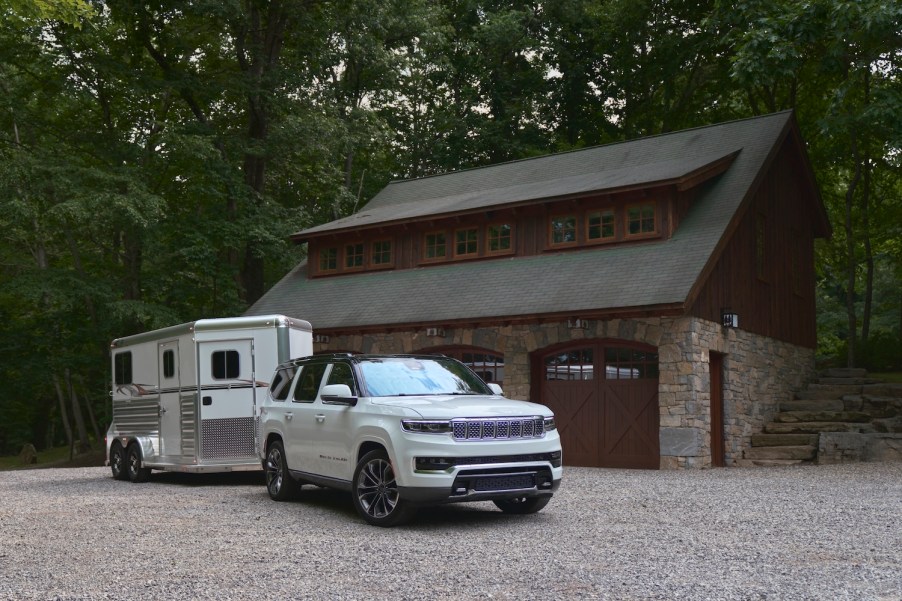
No One is Buying Full-Frame SUVs
Sales of full-size SUVs are down across the board. Despite exciting new developments in the full-frame, truck-based SUV segment, consumers are either opting for smaller vehicles or avoiding the dealership altogether.
Detroit’s truck-based SUVs are not selling well

All of the Detroit Three build world-class pickup trucks. It makes sense that these companies leverage their pickup truck research and development into truck-based, full-frame SUVs. These SUVs are defined by sharing their ladder-frame layout with pickup trucks. This makes them durable and often gives them a high trailering capacity. But in 2022, these heavy-duty stats are not winning over buyers.
General Motors offers several SUVs based on its GMC Sierra/Chevrolet Silverado chassis. The GMC variant is the Yukon. By the beginning of July 2021, GMC had sold 42,317 Yukons–according to GoodCarBadCar.net. But by July 2022, this number had plummeted 9.53%, to just 38,367 SUVs sold.
Chevrolet fans can choose the larger Suburban or the slightly smaller Chevy Tahoe SUV. But both of these vehicles are seeing a sales slump. By the beginning of July 2021, Chevy had sold 50,935 Tahoes but this number has fallen 11.56% to just 45,047 Tahoes sold thus far in 2022. The Chevrolet Suburban is seeing an even worse sales year. By July 1st, 2021, Chevy had sold 61,460 SUVs, but this number plummeted 65.31%: Chevy has only sold 21,322 Suburbans in 2022.
The F-150-based Ford Expedition is experiencing similar sales problems. By July 2021, Ford had sold 47,508 Expeditions. But by the same time in 2022, this number had nosedived by 51,91% to just 22,847 units sold.
Nissan and Toyota’s full-size SUVs are hurting even worse

Both Toyota and Nissan actually build a full-size pickup truck in the United States, exclusively for the North American market. Because there is a demand for full-size, truck-based SUVs, it makes sense that both these automakers recycle their pickup truck chassis into a full-frame SUV.
Nissan’s full-size SUV is the Armada, and its sales are hurting worse than even the Chevrolet Suburban. By July 2022, Nissan had sold 14,894 Armada SUVs. But for 2021, this number fell a whopping 69.52% to just 4,539 vehicles sold.
Toyota’s full-size, Tundra-based SUV is the Sequoia. Back in 2021, the Sequoia came in last place: by July the automaker only sold 4,338 units. But since then, its sales have absolutely tanked, falling 89% to just 477 vehicles sold in 2022.
There are two interesting things happening with the Sequoia. Firstly, this full-frame SUV competes with Toyota’s celebrated third-row crossover, the Toyota Highlander. Secondly, the automaker has already unveiled its third-generation Sequoia. The 2023 Toyota Sequoia will be the industry’s first full-size SUV available exclusively with a hybrid engine.
The Jeep Wagoneer is a competitive new full-size SUV

One reason Ford and GM’s full-size SUVs may be struggling is Stellantis joining the segment. The third Detroit automaker engineered a Ram-based full-size SUV and resurrected Jeep’s Wagoneer badge for the 2022 model year.
This SUV’s quirky styling and class-leading towing capacity certainly put Ford and GM on their back feet. But Stellantis has only sold 17,277 Wagoneers in 2022, so far. This is not nearly enough units to explain every other SUV’s sales slump.
Next read about the top towing SUVs or see the full-size SUVs of 2022 ranked in the video below:



